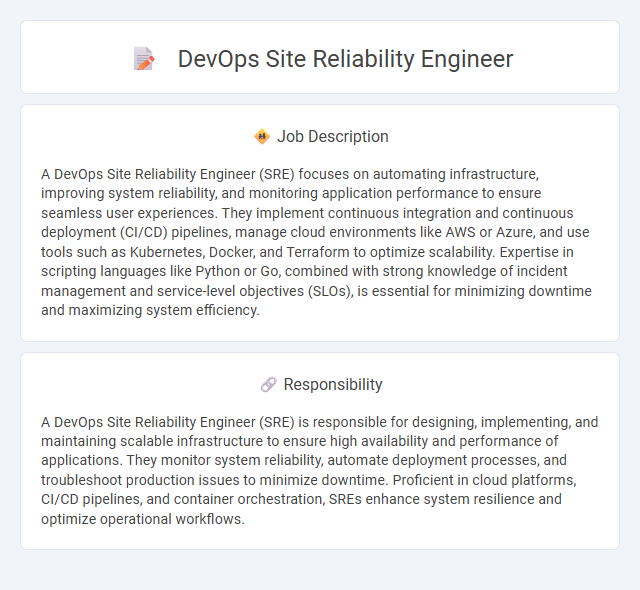
A DevOps Site Reliability Engineer (SRE) focuses on automating infrastructure, improving system reliability, and monitoring application performance to ensure seamless user experiences. They implement continuous integration and continuous deployment (CI/CD) pipelines, manage cloud environments like AWS or Azure, and use tools such as Kubernetes, Docker, and Terraform to optimize scalability. Expertise in scripting languages like Python or Go, combined with strong knowledge of incident management and service-level objectives (SLOs), is essential for minimizing downtime and maximizing system efficiency.
Individuals who thrive in high-pressure environments and enjoy solving complex technical problems may find a DevOps Site Reliability Engineer role suitable for their skills. Those with strong collaboration abilities and a passion for automation and continuous improvement will likely adapt well to the dynamic nature of this job. However, individuals who prefer predictable routines or struggle with on-call responsibilities might find the role challenging.
Qualification
A DevOps Site Reliability Engineer typically requires expertise in cloud platforms such as AWS, Azure, or Google Cloud, alongside proficiency in container orchestration tools like Kubernetes and Docker. Strong knowledge of CI/CD pipelines, infrastructure as code with Terraform or Ansible, and scripting languages such as Python or Bash is essential. Experience with monitoring solutions like Prometheus, Grafana, and incident management systems ensures effective system reliability and performance optimization.
Responsibility
A DevOps Site Reliability Engineer (SRE) is responsible for designing, implementing, and maintaining scalable infrastructure to ensure high availability and performance of applications. They monitor system reliability, automate deployment processes, and troubleshoot production issues to minimize downtime. Proficient in cloud platforms, CI/CD pipelines, and container orchestration, SREs enhance system resilience and optimize operational workflows.
Benefit
A DevOps site reliability engineer likely improves system reliability and uptime, which can enhance user satisfaction and reduce downtime costs. They probably streamline deployment processes, increasing operational efficiency and accelerating software delivery. This role may also contribute to better collaboration between development and operations teams, fostering a more agile and resilient IT environment.
Challenge
The role of a DevOps site reliability engineer likely involves managing complex systems to ensure high availability and performance, which presents constant challenges. They probably face unpredictable incidents requiring fast troubleshooting and innovative solutions under pressure. Balancing automation with manual intervention might be a frequent hurdle in maintaining system reliability and scalability.
Career Advancement
A career as a DevOps Site Reliability Engineer (SRE) offers rapid advancement opportunities through mastering cloud infrastructure, automation, and continuous integration/continuous deployment (CI/CD) pipelines. Professionals skilled in container orchestration tools like Kubernetes and expertise in monitoring systems such as Prometheus and Grafana are highly sought after for leadership roles. Progression often leads to positions like Senior SRE, DevOps Manager, or Cloud Architect, driven by proven performance in system reliability and scalability.
 kuljobs.com
kuljobs.com